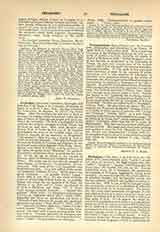

Feuchtersleben, BARON ERNST VON, an Austrian poet, philosopher, and physician; b. at Vienna, April 29, 1806; d. September 3, 1849. After completing his course at the Theresian Academy, he took up the study of medicine in 1825, receiving the degree of Doctor of Medicine in 1833. In 1844 he began a series of free lectures on psychiatry at the University of Vienna, the next year became dean of the medical faculty, and in 1847 was made vice-director of medicochirurgical studies. In July, 1848, he was appointed undersecretary of state in the ministry of public instruction, and in this capacity he attempted to introduce some important reforms in the system of education, but, discouraged by the difficulties which he encountered, he resigned in December of the following year. As a medico-philosophical writer, Feuchtersleben attained great popularity, especially through his book “Zur Diatetik der Seele “‘ (Vienna, 1838), which went through many editions (46th in 1896). Hardly less famous is his “Lehrbuch der arztlichen Seelenkunde” (Vienna, 1845), translated into English by H. Evans Lloyd under the title of “Principles of Medical Psychology” (revised and edited by B. G. Babington, London, 1847). He also wrote an essay, “Die Gewissheit and Wurde der Heilkunst” (Vienna, 1839), a new edition of which appeared under the title “Aerzte and Publikum” (Vienna, 1845). As a poet Feuchtersleben is chiefly known by the well-known song, “Es ist bestimmt in Gottes Rat”, which appeared in “Gedichte” (Stuttgart, 1836) and was set to music by Mendelssohn. His later poems are more philosophical and critical. His essays and other prose writings were published under the title “Beitrage zur Litteratur-, Kunst- and Lebenstheorie” (Vienna, 1837-41). His complete works (exclusive of his medical writings) were edited by Friedrich Hebbel (7 vols., Vienna, 1851-53).
ARTHUR F. J. REMY

